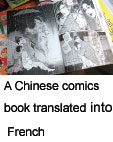| Home / Books & Magazines / Literati | Tools: Save | Print | E-mail | Most Read |
| Chinese Comics in Europe |
| Adjust font size: |
Japanese comics have long been established in European markets, but the interaction with Asia had pushed publishers to look for books in other countries. In France, about 4,000 new comics books are available in the market each year. Among them, 1,000 are Asian comics, mostly from Japan. "Europeans have strong interest for Asian culture, probably influenced by video games and movies. Japanese comics alone cannot satisfy all needs. We need to look for productions from other countries, such as China and Vietnam," said Nadia Gibert, editor of Casterman Editions. The Belgium-based publisher, Casterman had translated Japanese and Korean comics into French. The publisher had also selected six comics by mainland, Hong Kong and Taiwan authors for French editions named under "Hua Shu" series. Some of the selected titles have already been published. The publisher will also arrange French artists to work with Hong Kong, Shanghai and Beijing authors for a comic book themed China. The book is scheduled for publication in late 2008 or early 2009. Three Hong Kong comics authors, Lee Chi-hoi, Lai Tat Tat Wing and Ah Ko, would participate in the project. Gibert said many mainland comics were strongly influenced by Japanese, but there were still authors creating comics with personalized style. When asked whether the European readers preferred comics in Oriental sense, Gibert said: "We stress personalized style, which is very subjective. We need comics books the content of which have never seen in the market. The comics should be different from the available titles." The publisher's associate editor, Nicolas Finet said he had always been to bookshops in China, and found out the comics authors. Lee Chi-hoi, the Hong Kong author whose works had been translated and published in Italy, Germany and Belgium since 1999, said the mainland's accession to the World Trade Organization had aroused Westerners' interest in the mainland. But Lee did not think having his works published overseas was an indication that his influence grows in other countries. "Comics is a common visual art language. Readers will still be moved by the pictures even though they do not know the words. So I don't think I am going beyond my limit to some other places," he said. Lee said the comic works has to be unique as overseas readers are curious and open-minded to appreciate different ideas. "They want to understand more about different parts of the world," he said. "It will not create positive result if the local author attempts to pander to the Westerners' perception of Oriental sense." (China Daily HK Edition July 21, 2007) |
| Tools: Save | Print | E-mail | Most Read |
 |
| Related Stories |
|
